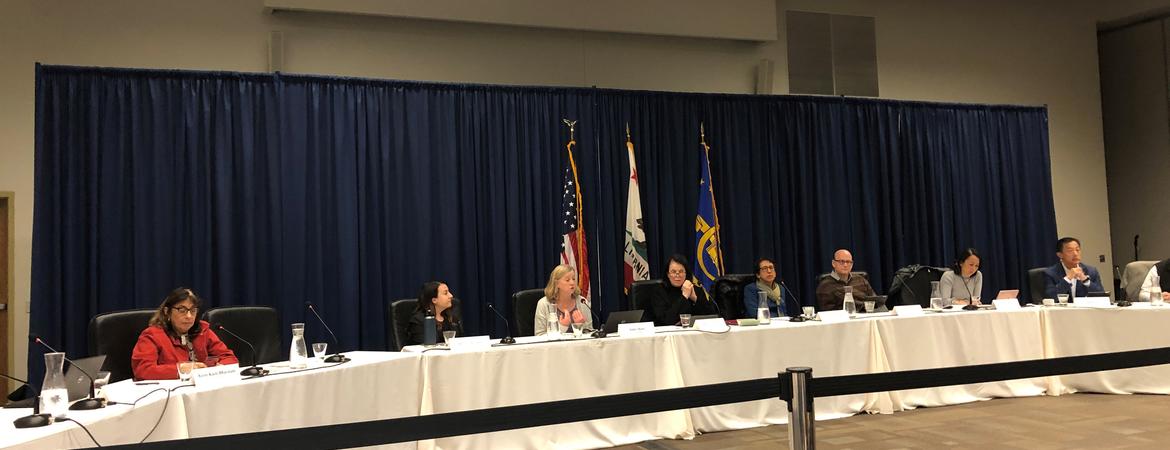UC Riverside faculty, students, staff, and community members outlined their hopes for the next University of California president at a Jan. 16 town hall forum.
The meeting of a select committee of UC Regents, appointed to lead the search for UC President Janet Napolitano’s replacement, is one of a series being held on UC campuses.
Regent Sherry Lansing, vice chair of the select committee, noted appointing a president is one of the most important actions performed by regents.
“As we all know, UC is a large and complex institution,” she said. “Therefore, it’s incredibly critical we find the right person who understands UC and someone who understands the challenges we face.”
Lansing said the committee, which is working with the search firm Storbeck/Pimental & Associates, hopes to complete the process and bring a recommendation to the full Board of Regents in May.
Comments from town hall forums on UC campuses will help inform that decision, she said.
Chancellor Kim A. Wilcox welcomed the regents to the campus.
“This is an important meeting for us,” he said. “It’s a chance to meet collectively with you and talk about our campus, its realities, and aspirations for the future.”
More than 30 people spoke at the meeting and raised a variety of priorities for the next UC leader. These included a commitment to diversity, continuing UC’s leading role in research, and maintaining academic excellence.
Some also asked that UC lead on issues such as fighting climate change and protecting students who are part of the Deferred Action for Childhood Arrivals, or DACA, program. Several speakers, particularly students, asked that the UC president keep in mind the challenges students face such as food insecurity and the costs of housing and tuition.
Many cited the campus’ continued growth, which is expected to continue, and the need for additional resources to meet those added demands such as more faculty, staff, classrooms, and other facilities. Some noted UCR is heavily reliant on tuition and fees as it receives less per student than other campuses, an imbalance they suggested should be corrected.
“We need a president who will serve and advocate for all and reverse the structural inequities that have deeply disadvantaged UCR,” said Patricia Morton, an associate professor in media and cultural studies and chair of the UCR Faculty Association.
Frances Sladek, a professor of cell biology, shared some anecdotes of students who performed well academically but faced financial challenges. She called them a scrappy bunch but said they need more support.
“We are fighting every step of the way,” Sladek said.
Peter Hayashida, vice chancellor of University Advancement, suggested the new president be a masterful, persuasive storyteller who can be a national leader on higher education.
“By sharing anecdotes of brilliant faculty scholars, talented students, committed staff, and accomplished alumni, higher education will once again capture the hearts and minds of a nation that has felt increasingly disenfranchised of postsecondary education and skeptical of its value,” he said. “The UC president must be a respected voice that rises above the din to persuade a cynical public that the survival of our way of life depends on preserving access to education.”
Lansing said the committee appreciated hearing from all the speakers and planned to dig deeper into some of the suggestions.
Interested parties can provide further input via email at UCPresidentSearch@ucop.edu and learn more about the process at the search website, she said.




